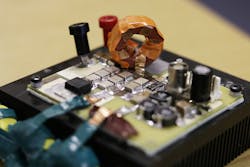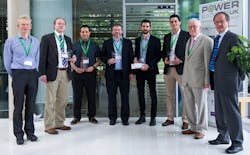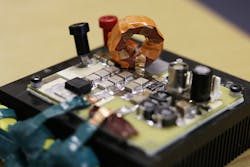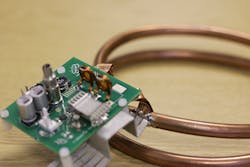A post-graduate team from Imperial College London has won the inaugural GaN Systems Geoff Haynes Future Power Challenge. The winners were announced at the EPSRC Centre for Power Electronics Annual Conference 2016, which took place in Nottingham, England.
Intended to be an annual event, the GaN Systems Geoff Haynes Future Power Challenge was jointly established by GaN Systems and the EPSRC Centre. Haynes is the recently retired co-founder of GaN Systems.
The Challenge was open to all UK power electronics postgraduate students—specifically, those who submitted research papers or posters that contributed to accelerating the use of GaN transistors in future power conversion or control applications. Entries covered subjects as diverse as the design of a novel compact motor with embedded filter windings and optimized p.w.m. control strategy for an A-NPC converter.
The winning team comes from Imperial College London’s Department of Electrical and Electronic Engineering. It includes Ph.D. students George Kkelis and Juan Manuel Arteaga, along with research assistants Dr. Sam Aldhaher and Dr. David Yates, and is supervised by Dr. Paul Mitcheson (Fig. 1). The team developed two inverter prototypes, each based on a Class-EF topology using GaN Systems’ GS66504B switches.
This new design maintains zero-voltage switching and delivers a constant output AC current, regardless of the load resistance value. The design allows a Class-E or Class-EF inverter to operate efficiently for any load. This was shown to significantly relax the requirement for accurate alignment of transmit and receive coils in a wireless power application.
“Our team had three posters competing in the GaN challenge,” says Arteaga. “The judges decided to award the three posters given the fact that we had been working together in most of their experiments.”
Usually posters for conferences might include pictures of the experiment, the collected data, simulations, results, analysis, and conclusions. For this particular completion, the format of the poster was completely free and there were no live demonstrations. Arteaga mentioned the posters awarded as:
- Class-E2 Resonant Converter with Inherent Output Voltage Regulation Operating at 6.78 MHz (Fig. 2).
- A 13.56 MHz Load Independent Inductive Power Transfer System with 73% DC-DC Efficiency (Fig. 3).
- Comparison between GaN and Si Devices in 6.78 MHz and 13.56 MHz DC/AC Inverters.
“The three posters were presented by George Kkelis and me in the Centre for Power Electronics Summer School,” Arteaga continues. “The posters presented the latest work developed by us, Dr. Paul Mitcheson (our supervisor), Dr. David Yates, and Dr. Samer Aldhaher, who developed the concept of the Load-Independent Class-EF Inverter—shown in his latest publication at the 2016 Wireless Power Transfer Conference.”
Haynes, Prof. Mark Johnson of the University of Nottingham, and Prof. Barrie Mecrow of Newcastle University judged the competition at the annual summer school event, organized by Ph.D. students from several universities that form the EPSRC Centre for Power Electronics. The judges saw all the posters competing for the challenge and talked to the postgraduate students who were presenting during the poster presentation sessions.
Presenting the award, GaN Systems’ president and co-founder, Girvan Patterson, underlined the importance of supporting the research initiatives between industry and academia to accelerate the adoption of disruptive technologies, as well as to inspire a new generation of engineers.
About the Author
Maria Guerra Blog
Power/Analog Editor
Maria Guerra is the Power/Analog Editor for Electronic Design. She is an Electrical Engineer with an MSEE from NYU Tandon School of Engineering. She has a very solid engineering background and extensive experience with technical documentation and writing. Before joining Electronic Design, she was an Electrical Engineer for Kellogg, Brown & Root Ltd (London. U.K.). During her years in the Oil and Gas Industry she was involved in a range of projects for both offshore and onshore designs. Her technical and soft skills bring a practical, hands-on approach to the Electronic Design team.




